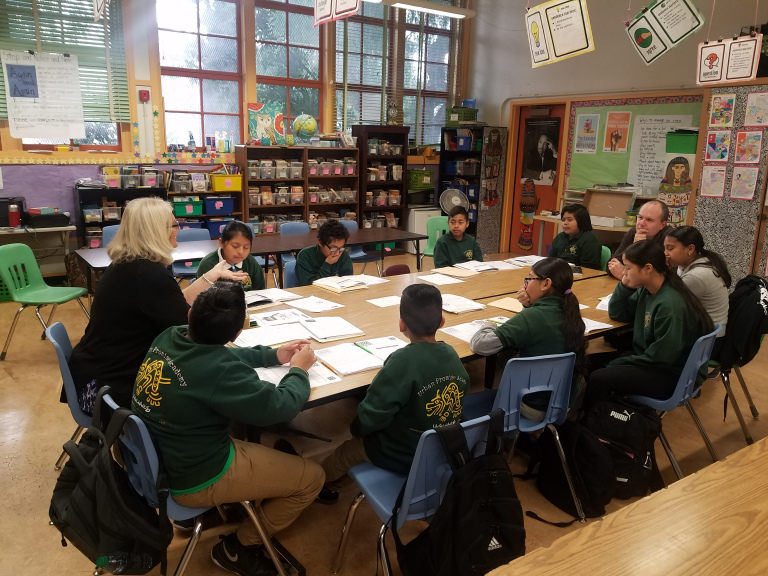(A repost from the great folks at OUSD’s ELLMA office by – Kristi Leunig, Instructional Facilitator, Urban Promise Academy)
Founded in 2008, the Morning Boost program (which now also has afternoon sessions) has contributed to Urban Promise Academy’s exceptionally high reclassification rate each year. In 2017-18, 35.7% of LTELS reclassified, compared to district average of 14.4%. Below, two founders share insights into Boost’s impact and journey over the past decade.
“I have been teaching Morning Boost since the program started in 2008. We have tried using many different curricular programs, and this year I’m enjoying using WordGen. I like the emphasis on speaking and using academic language, and I see my students feeling more confident in expressing their ideas and opinions. We are finding, however, that Word Gen needs a lot of supplementing. It asks them to debate issues, but doesn’t give them enough evidence to build a strong argument. So the teachers end up spending a lot of time looking for additional resources on each topic. It’s still more engaging than other programs we’ve tried.
I see Morning Boost as a place where my ELL students can really shine, where they can practice their English skills in a safe and fun environment, and where they can develop the confidence to take risks in their Gen Ed classes. It’s so wonderful to see them start to participate more and share their ideas in their regular classes! I love seeing their pride and confidence grow!”
– Lisa Hiltbrand, 6th grade Humanities Teacher at Urban Promise Academy

“Before Boost started, people didn’t really use the term LTEL much until the until Laurie Olson wrote the report Reparable Harm. We weren’t seeing our English Language Learners as having distinct needs within the larger group. After reading that report, we understood that the majority of our students are LTELs and what that means. So we created an extra class for them [Boost] that really focuses on oral language development.
One thing that we do for all students at UPA is goal setting and reflection, it’s one of the best practices recommended by Laurie Olsen. Students across the school, not just in Boost, are setting academic goals, tracking their progress and then reflecting on it. It’s all around knowing your academic strengths, your areas of growth and then having someone there to support you through improving.
When we first started Boost, we didn’t have a unit to explain to students what LTEL means. We kind of went right into the curriculum. Kids were taking the CELDT every year and had no idea why; no one had explained the importance them. It felt like something was missing. So, I created a unit called “Building Awareness” to help provide purpose and understanding of Why am I in this class? What does it mean to be an LTEL? What do I need to do to reclassify? Now that’s how everyone kicks it off and just providing that little bit of purpose was the motivator that a lot of kids needed.”
Advertisements

